I've reviewed the new Twilight Zone, so it's only fair I review an episode of the original. The comparisons are interesting. And maybe I'll review the 80s TZ, since it's just starting to air on one of my local retro-channels, MeTV.
Why "The Obsolete Man"? I've always found it an interesting episode, and I'm not the only one judging from other reviews on the 'net. Why is it so interesting? Four reasons: the performances, the dialogue, the direction, and Rod Serling's sincerity
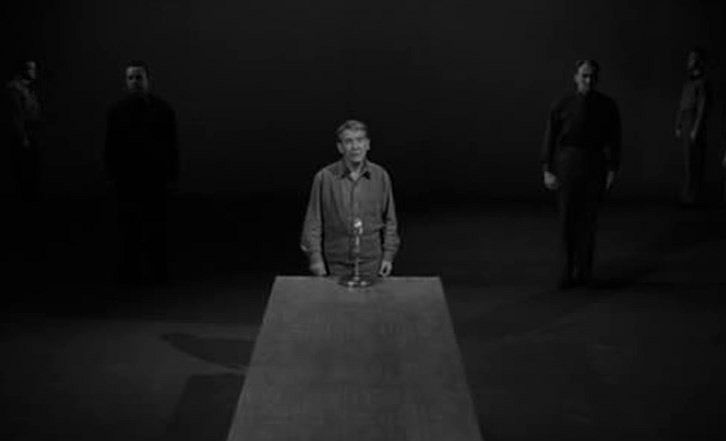
The first part of the episode is Romney's trial, such as it is. Which is him being hauled into a surrealistic courtroom where the State doesn't seem to have paid its electrical bill. The Chancellor (HITG Fritz Weaver) reads off the charge of obsolescence and basically browbeats Romney, telling him he's obsolete and the State considers books and thus librarians obsolete. There are a bunch of blandly-dressed jurors watching as well as a Subaltern (Josip Elic), none of which have anything to do with the trial. None of them except the Subaltern even have any dialogue.
The State is very obliging, in that they give the convicted their choice of execution. Rather than choose death among a dozen naked sex partners, Romney makes two unheard-of requests: only he and his executioner will know the means of his execution, and it will be televised live. The former is within the rules, whatever they are, and the Chancellor agrees to the second to impress the populace with the televised execution of someone defying the State.
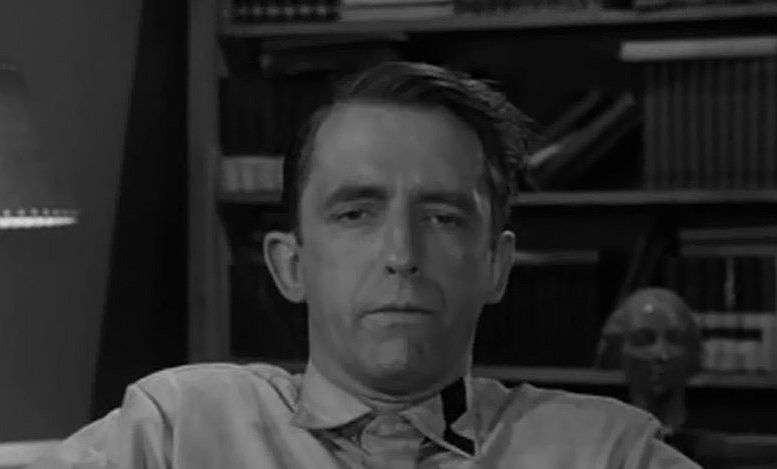
Returning to the courtroom, the Chancellor discovers the Subaltern has taken his position and declares the Chancellor obsolete because he's a coward who failed to demonstrate the strength of the State. There's no one-year investigation and execution by preferred manner for the Chancellor. He tries to run and the jurors start moaning, cut him off, then tear him apart. Or at least that's what implied: it's 1961, so the episode ends with the Chancellor being dragged to the floor by the howling mob.
Serling shows up for the outro, stating the State is obsolete and implying it will eventually meet the same fate.
The chancellor- the late chancellor- was only partly correct. He was obsolete, but so is the state, the entity he worshiped. Any state, any entity, any ideology that fails to recognize the worth, the dignity, the rights of man- that state is obsolete. A case to be filed under "M" for Mankind in The Twilight Zone.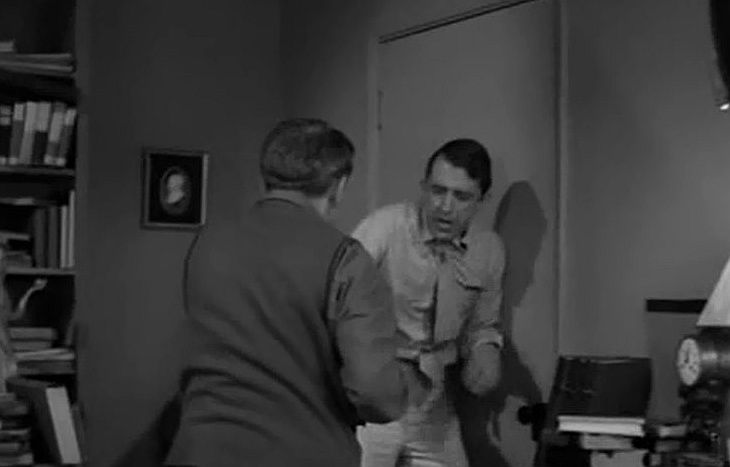
The first strength of the episode is the performances: Meredith and Weaver give it their all. They pretty much carry the entire show. Both aren't particularly well-rounded or believable: Romney is a virtuous man who never gives in to fear or panic. He's helped by a convenient set of rules about execution. The Chancellor is bombastic, then cowardly, then pitiful. Weaver does best at the latter: his pleas to serve the State are particularly moving, as much as he's the bad guy and isn't particularly moving. If the episode ran longer or made them anything more than mouthpieces for Serling's philosophy, they'd be ludicrous.
The second strength is the dialogue. The episode cuts right to the chase: Romney is tried, Romney's fate is a given, Romney turns the rules against his oppressors, Romney dies but achieves his goal, the Chancellor is hung on his own petard. Romney later echoes a lot of the earlier dialogue the Chancellor directed at him. The librarian refers to "you people" and the Chancellor asks for "clarification of the term". Later, the Chancellor says "they" won't let him stay in Romney's apartment and Romney asks for "clarification of the term".
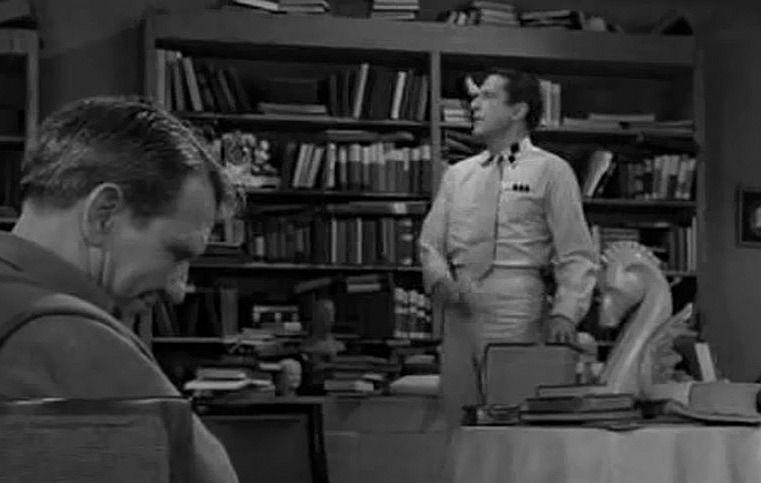
There's also the ending, which has the jurors, or observers, or whatever the heck they are slowly growl in increasing volume, then rush the Chancellor and tear him apart. But there are also lots of little touches, like the Subaltern's sing-song voice as he passes sentence on the Chancellor.
I've noted the flaws in the episode, and other reviewers have noted them as well. Serling is as preachy as he ever gets. He's sending a message, but it's so basic ("Fascism is bad") and the State is such a vague yet stupid nemesis, it's hard to view them as at all realistic. There's no doubt Romney will "win", since he's so smart and saintly.
And the symbolism is as thick as it is shallow. Romney Wordsworth is a librarian, and he's a carpenter. No Christ symbology there! I do find it interesting Romney reads from the Bible: it's a Christian/religious touch you wouldn't find much of in 2019 TV. Granted, the episode isn't so much about Christian faith as the strength of the individual and faith in general. But Serling frames it in Christian terms. When the Chancellor begs Romney to release him in "the name of God", you get the impression he's invoking God rather than just using the term.
And while Romney never wavers in his faith, the Chancellor's faith in the State first crumbles, but then is curiously restored when he presents his faith in the State as the reason it should spare him at the end. Given how strong said faith is in the end, it's surprisingly how quickly it crumbled in the face of death but yet sprang back up again.
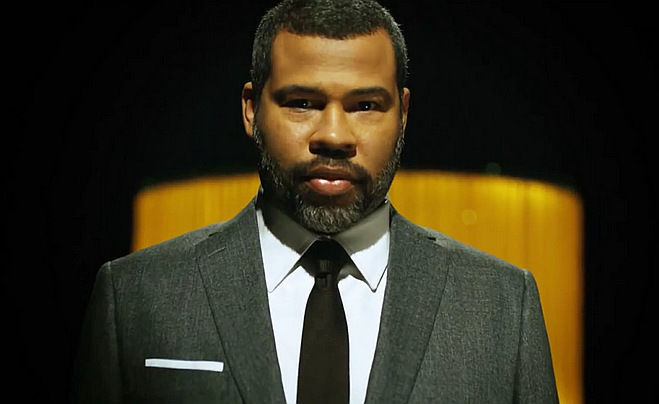
Part of why "The Obsolete Man" works is because of its sincerity. Like Serling, or hate him, he put himself out there. He may have worn his sentiments on his sleeve, but at least it's his sleeve. The newer TZ feels like Peele calling a bunch of creative people together and giving them their marching orders. If you don't like the original TZ because of its occasional social commentary, you can enjoy it as the study of one man: Rod Serling. Say what you will about the triteness of "The Obsolete Man": it feels like Serling is telling us what he really feels. His feeling isn't particularly original, and he acts as if the audience hasn't realized "fascism = bad", but what he does, he does with feeling. And that makes all the difference. Along with the acting and the directing.
But that's just my opinion, I could be wrong. What do you think?
Written by Gislef on May 28, 2019




This is one of my favorite episodes of the original series. The pacing is good and the episode doesn't feel drawn out to fill time or too rushed. I think that's one of the downsides to the new series: the longer episodes feel drawn out. While, yes, some may feel it's a bit preachy, you also have to remember that this was a product of the time as well. Personally I hold to the values the episode exhibits, but still feel it gives a balance between religion and societal commentary.
I don't follow the 4th of July and New Year's Eve marathons that religiously. But I'm pretty sure they do show it, at a reasonably prominent time. Usually 10 or 11 pm on the night of the holiday. As opposed to burying it at 4 am. It's one of those episodes I see every time I flip the channel over.
Wow why don't they play this one during the yearly TZ marathons?
PatrickAbe: I'm not sure where you're going, at least as far as Serling is concerned in 1961. He wrote mostly about what he knew: fighting in World War II, advertising executives, TV shows, the creative process, and airplanes, among other things. His experience was primarily with the fascist governments of World War II: Germany, Italy, and Japan. Since I was looking at his feelings and his sincerity, I was primarily concerned about what he thought of the State. Serling seems to think that "the State" in one form or another just rolls on, rather than has cycles of being defeated and rising up as you suggest. Which is a valid viewpoint, but not the one Serling seemed to be aiming for.
That's part of why the new TZ (and the 2000s version) doesn't connect for me. I don't feel like I'm watching the personal views of the writer, because it's not one writer and they don't seem to have a viewpoint. That to me is the essence of the original TZ: Serling (and Matheson, and Beaumont, and Hamner) for the most part wrote what he believed and had experienced, albeit with a fantastical twist. Jorden Peele feels like he wrote what he believed in Get Out and Us. With the new series, not really except for "The Comedian" and "Replay". Serling wrote like he experienced what was going on, at least a "real" version of it. The new TZ's creative team, not so much.
The 80s version I'm slowly rewatching since as I noted, my retro-channel is rerunning it. There either the stories were by pro writers like Harlan Ellison, Ray Bradbury, and Stephen King. Or they felt like material the writer had actual first-hand experience of. Like J. Michael Straczynski and "Acts of Terror". There are many that aren't either of those, though.
Another good example is the original Outer Limits in its first season. Writer and creator Joseph Stefano wrote many of his stories based on his time in therapy. Mediocre episodes like "Zzzzz" and "It Crawled Out of the Woodwork" are a lot better because they feel like Stefano's personal issues. Which by many accounts they were: issues he was working out in therapy at the time.
This one is one of my favorites.
"Fascism = Bad"? There are other-than-Fascist states that fulfill the "1984" image of "a boot stamping on a human face...forever." The Authoritarian State is on display here, whether driven by "the dictatorship of the proletariat" or "The Book," the boot is the same. "Romney Wordsworth" is a stand in for "the rest of us," whom we hope and pray are as steadfast in opposition to The Authoritarian State, even to death. I recall a 1960's slogan that goes: "You have killed one, but you cannot kill all of us." It won't happen tomorrow, but it will happen someday; the boot will be defeated, and human faces will see each other, once again. (Until the next Boss/Commissar/Fuhrer tries to put on the boot.)